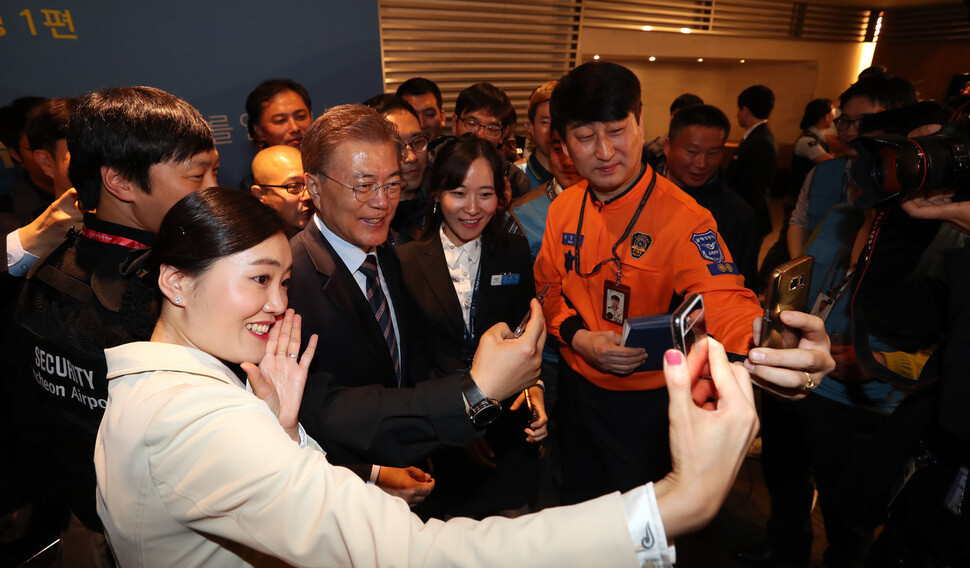hankyoreh
Links to other country sites 다른 나라 사이트 링크
President Moon declares era of zero irregular employment at public institutions

President Moon Jae-in made what may be called his first step toward implementing his election pledge of having public institutions lead the way in creating good jobs by announcing plans to “usher in an era of zero irregular work in the public sector during my term” during a May 12 visit to the Incheon International Airport Corporation.
In addition to government irregular employment policy, the statement could also been seen as announcing that the methods of assessing public institution management are in for a qualitative change.
The same day, Moon ordered government agencies to carry out full-scale surveys of irregular employment conditions in the public sector and draft road maps for minimizing the issue. His direction may mark the first step toward a resolution of irregular employment at public institutions.
In South Korea, irregular workers suffer low wages, no benefits and poor job security. After two years, their positions must either be made permanent or eliminated. “The labor community has been demanding it for the past ten years, but the government hasn’t once conducted a survey of indirect public sector employment in things like state-subsidized projects or social services commissioned from the private sector,” said Woo Moon-sook, head of the irregular employment strategy bureau for the Korean Confederation of Trade Unions (KCTU) non-organized irregular worker strategy office.
“This is going to show for the first time what indirect employment conditions are like in permanent and ongoing duties,” Woo said.
National Assembly Speaker Chung Sye-kyun previously moved to hire National Assembly cleaning workers directly, while Seoul Mayor Park Won-soon did the same for safety workers at Seoul Metro and the Seoul Metropolitan Rapid Transit Corporation. But this is the first time the government has led the way in announcing plans for a zero irregular employment era in the public sector.
Hiring of irregular workers in the public sector became common practice in the years after the 1997 foreign exchange crisis. The Kim Dae-jung administration (1998-2003) at the time pushed heavily for public sector reforms and privatization of public enterprise according to International Monetary Fund (IMF) guidelines.
Over the years, the labor world has demanded a solution to the issue of irregular employment at public institutions. But the institutions have countered that their hands are tied due to government quotas and budget constraints. Their argument has been that they are obliged to follow along with the government’s priority on cutting costs in the name of “public institution reforms.”
“Our financial conditions aren’t bad, but we haven’t been able to increase [regular] staffing or personnel costs because of the Ministry of Strategy and Finance guidelines,” explained an Incheon International Airport Corporation source.
“If the government changes its standards for assessing public institution management performance, there would be no reason not to convert workers to regular status,” the source said.
Moon previously pledged to encourage reductions in irregular employment by introducing an “employment-friendly management assessment system” in the public sector. His announcement of plans on May 12 to convert 10,000 Incheon Airport workers to regular status is being read as a signal that other public institutions and the central and local governments will be implementing direct employment. As of 2012, there were 312,000 people employed in irregular positions and public institutions.
An increase in better-quality jobs at public institutions could lead to stiffer government punishments on irregular employment in the private sector. One of Moon’s election pledges was to introduce a system limiting at the source the grounds under which irregular workers could be hired. The system would require regular employment as a rule for permanent and ongoing duties, while permitting irregular employment only in exceptional cases such as childbirth and leave.
By Jeong Eun-joo, staff reporter
Please direct questions or comments to [english@hani.co.kr]

Editorial・opinion
![[Column] Has Korea, too, crossed the Rubicon on China? [Column] Has Korea, too, crossed the Rubicon on China?](https://flexible.img.hani.co.kr/flexible/normal/500/300/imgdb/original/2024/0419/9317135153409185.jpg) [Column] Has Korea, too, crossed the Rubicon on China?
[Column] Has Korea, too, crossed the Rubicon on China?![[Correspondent’s column] In Japan’s alliance with US, echoes of its past alliances with UK [Correspondent’s column] In Japan’s alliance with US, echoes of its past alliances with UK](https://flexible.img.hani.co.kr/flexible/normal/500/300/imgdb/original/2024/0419/2317135166563519.jpg) [Correspondent’s column] In Japan’s alliance with US, echoes of its past alliances with UK
[Correspondent’s column] In Japan’s alliance with US, echoes of its past alliances with UK- [Editorial] Does Yoon think the Korean public is wrong?
- [Editorial] As it bolsters its alliance with US, Japan must be accountable for past
- [Guest essay] Amending the Constitution is Yoon’s key to leaving office in public’s good graces
- [Editorial] 10 years on, lessons of Sewol tragedy must never be forgotten
- [Column] A death blow to Korea’s prosecutor politics
- [Correspondent’s column] The US and the end of Japanese pacifism
- [Guest essay] How Korea turned its trainee doctors into monsters
- [Guest essay] As someone who helped forge Seoul-Moscow ties, their status today troubles me
Most viewed articles
- 1[Column] The clock is ticking for Korea’s first lady
- 2Samsung barricades office as unionized workers strike for better conditions
- 3[Editorial] When the choice is kids or career, Korea will never overcome birth rate woes
- 4[News analysis] After elections, prosecutorial reform will likely make legislative agenda
- 5S. Korea, Japan reaffirm commitment to strengthening trilateral ties with US
- 6All eyes on Xiaomi after it pulls off EV that Apple couldn’t
- 7After 2 months of delayed, denied medical care, Koreans worry worst may be yet to come
- 8US overtakes China as Korea’s top export market, prompting trade sanction jitters
- 9[Column] Has Korea, too, crossed the Rubicon on China?
- 10Hong Se-hwa, voice for tolerance whose memoir of exile touched a chord, dies at 76